Table of Contents
MESSAGE FROM THE VETERANS OMBUD
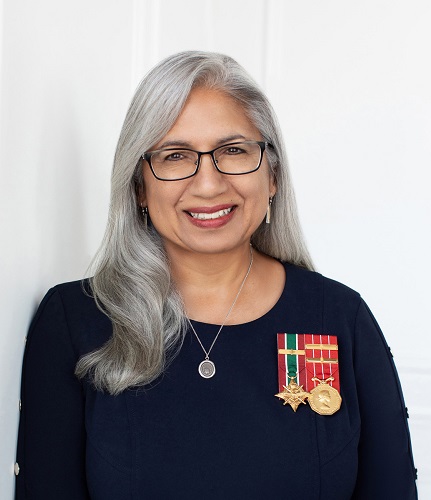
The highlight of 2022-2023 was the return to in-person outreach, events, and work. Notably, it was the first time since being named the Veterans Ombud in November 2020, that I was able to connect, in-person, with the Veterans community from coast-to-coast.
It is important for Veterans to know that our Office is here to provide Ombud services to those who feel that Veterans Affairs Canada (VAC) decisions have been unfair in respect of their requests for benefits or programs. As we continue to conduct in-person outreach, our Office will try to improve the ways in which we reach Veterans, their families and friends, to ensure they are able to attend our town halls, ask questions, and learn more about the services we offer.
The number one complaint our Office continues to hear is about wait times for disability benefit decisions. In Fall 2022, we published an update on the time Veterans and Serving Members are waiting for VAC decisions for their disability claim applications. While VAC has done a good job in bringing down the backlog of claims waiting for adjudication, claimants are still waiting on average much longer than the Department’s published service standard of 16 weeks.
Also, we were made aware of an alarming situation concerning women RCMP Veterans who are claimants to the Merlo Davidson settlement and who are recipients of a VAC disability pension for a related condition. We found unfairness in the way that VAC disability pensions were being administered for some settlement claimants. While legislation requires VAC reduce disability pensions where pension applicants are in receipt of compensation for the same condition, we found that the first two settlement levels clearly did not compensate for ongoing disability. These claimants’ disability pensions were in fact being reduced. It is unfortunate that this has become known as a “clawback”, and as a result I am concerned that there are women RCMP Veterans who may not engage with VAC for the benefits they desperately need. We will continue to follow the progress by VAC on the recommendations made in my December 2022 letter to the Minister of Veterans Affairs.
Another concern which is top of mind, is how effectively services are provided to Indigenous Veterans.
During our outreach visits, particularly in Western Canada, we heard that Indigenous Veterans may face additional barriers in receiving benefits and programs from VAC. I look forward to increasing our efforts to learn more about the unique issues facing Indigenous Veteran communities, and I stand ready to help Indigenous Veterans on issues of unfairness.
Our mission remains focused on Canadian Armed Forces and Royal Canadian Mounted Police Veterans and their families, on investigating their complaints, and challenging the policies and decisions of VAC where we find individual or systemic unfairness. Every day, each member of our team strives to be an independent and respected voice for fairness, and to be a champion for the well-being of Veterans and their families. I continue to feel privileged to work with the dedicated members of this Office and represent the work that they do.

Colonel (Retired) Nishika Jardine
Veterans Ombud
OUR ORGANIZATION
ADVANCING FAIRNESS FOR CANADA’S VETERANS
Our organization is made up of the:
- Veterans Ombud
- Deputy Veterans Ombud and Executive Director
- Intervention Services Directorate
- Strategic Review and Analysis Directorate
- Communications Directorate
- Corporate Services Directorate
The OVO has offices in Charlottetown, PEI, and the National Capital Region (NCR), with an average of 35 employees working across both locations. After nearly three years of remote work, in January 2023, the OVO moved to a hybrid work model, meaning staff are in the office a minimum of two days a week in both Charlottetown and the NCR.
SERVING VETERANS AND THEIR FAMILIES
WHO WE ARE
The Office of the Veterans Ombud (OVO) reviews complaints and challenges the policies and decisions of Veterans Affairs Canada (VAC) to identify individual or systemic unfairness. We work to be an independent and respected voice for fairness and a champion for the well-being of Veterans and their families.
WHAT WE DO
We operate independently and impartially:
- We listen to our clients
- We review their files with them
- We walk them through the process to their next steps
If we start a formal review of a complaint, we will explain how that works, evaluate how a client was treated, how the process was followed and whether the outcome is fair.
WHY SHOULD VETERANS CONTACT US?
Everyone seeking or receiving services or benefits from VAC has the right to be treated with respect, dignity, fairness and courtesy.
This is set out by VAC in the Veterans Bill of Rights, which establishes their right to fair treatment.
If Veterans feel that any of their rights have not been upheld or a decision is unfair, they have the right to make a complaint to the OVO.
Our Priorities
- Building trust: We meet regularly with the Veterans community and provide service to anyone who brings an issue to us.
- Creating better outcomes for the Veterans community: When we notice problems and/or gaps with VAC services and benefits, we recommend changes to improve the overall health and well-being of Veterans and their families.
- Ensuring fair and timely access: We continuously work to identify unfair, inefficient and overly complex elements in the administration of VAC programs and services.
OUR WORK
SHARING, LISTENING AND CONNECTING
Connecting with Canada’s Veterans and their families, and other stakeholders is critical to our success.
In 2022-2023, the OVO resumed in-person outreach with the Veterans community and stakeholders. This included holding town halls in various locations throughout British Columbia, Alberta, Ontario, and Nova Scotia, where we listened to the issues impacting local Veterans, serving CAF and RCMP members, survivors, family and friends, to ensure the work we do is best serving them. In addition, throughout our engagement opportunities, we aimed to educate our target audience, partners, stakeholders, and decision-makers about the OVO’s mandate and the services we provide.
The OVO is grateful for the opportunity to meet with the Veterans community over the past year. The insight gained from our outreach activities will help shape our strategic priorities.
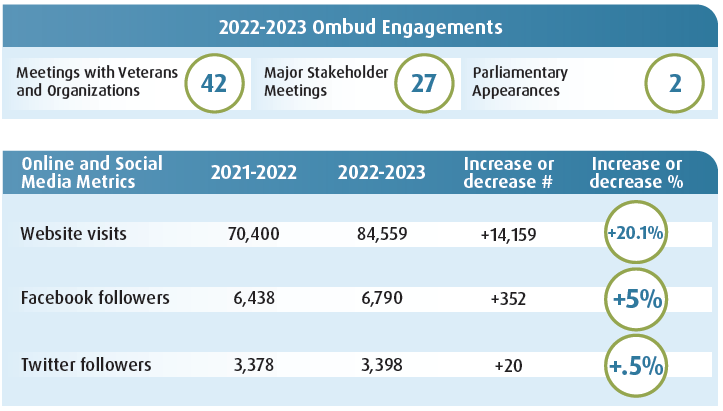
VETERANS OMBUD'S ADVISORY COUNCIL (VOAC)
VOAC advises the Veterans Ombud on matters related to the OVO’s mandate. VOAC members represent the diverse perspectives found within the Veterans community. Through their expertise and knowledge, Council members identify emerging issues and provide advice to address them. VOAC members also raise awareness within the Veterans community about the OVO and the work we do.
Members 2021-2022
Jane Hall
Brigitte Laverdure
David MacLeod
Brian McKenna
Jay Milne
Rebekah Mitchell
Shauna Mulligan
Tim O’Loan
Kimberley Unterganschnigg
Steve Walker
VETERANS OMBUD COMMENDATION AWARDS
The annual Commendation Awards honour outstanding individuals and groups who demonstrate their commitment to the Veterans community through their selfless hard work. Recipients are nominated by their peers for their exceptional contributions and dedication to improving the lives of Veterans and their families.
2022 Recipients
Lifetime Contribution
Fern Taillefer
Kent Griffiths
Sean Bruyea
Victoria Coffey
Individual Contribution
John Robert Walsh
Michael Pretty
Local Organization
Keith and Sue Henderson
National Organization
Helmets to Hardhats
OUR WORK
FEATURED CASES
REHAB EXPENSES - DEPENDENT CARE – ADDITIONAL CHILD CARE EXPENSES DENIED
VOCATIONAL REHABILITATION PROGRAM
RED ZONE DENIAL OVERTURNED
OUR CLIENTS
As in previous years, the complaints we received from Veterans and those advocating for them related primarily to Veterans’ health supports and the wait time associated with disability benefit application decisions. We were able to meet or exceed our service standard by investigating 94% of complaints within 60 days, responding to 82% of information requests within five days, and making 86% of referrals within 10 days.
Intervention by the Numbers
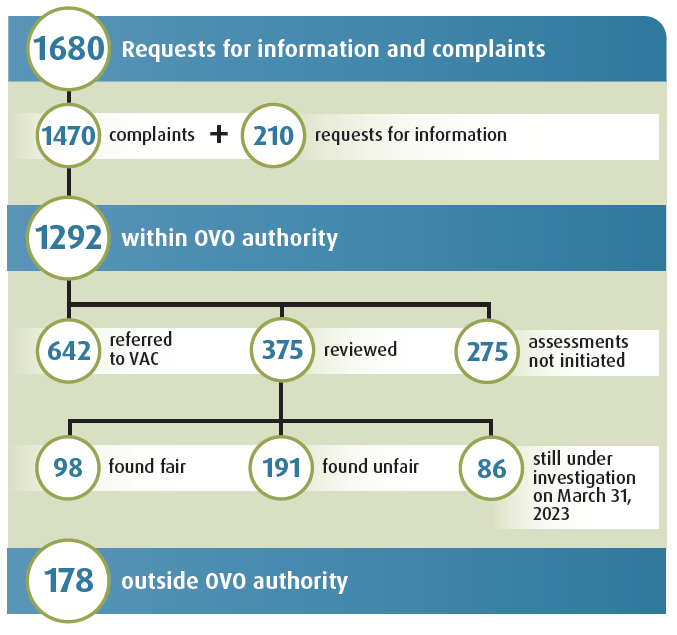
Alternative text
Requests for Information and Complaints: 1680
Complaints: 1470 + Requests for Information: 210
Of the 1470 Complaints:
- Within OVO Authority: 1292
- Outside OVO Authority (Information and Referrals provided): 178
Of the 1292 within OVO Authority:
- Cases Referred to VAC: 642
- Reviewed: 375
- Assessment not initiated: 275
Of the 375 Opened for Investigation:
- Found Unfair: 191
- Found Fair: 98
- Still Under Investigation: 86
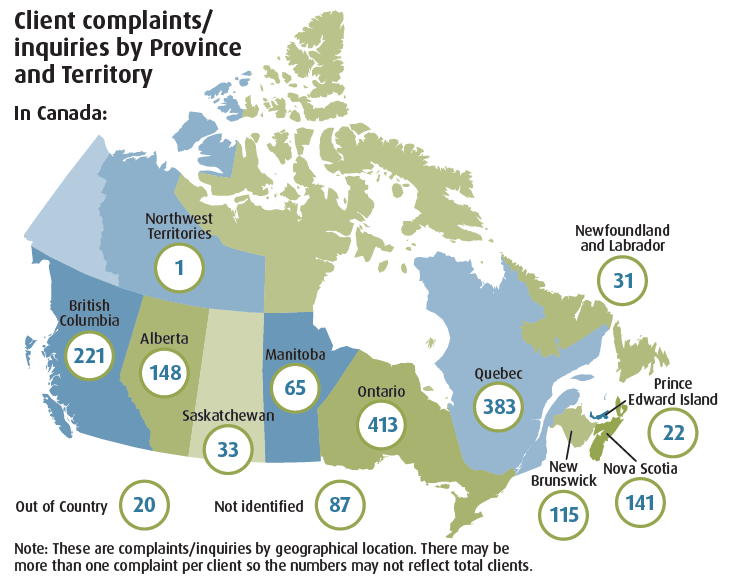
Alternative text
Client complaints inquiries by Province and Territory in Canada:
- Northwest Territories: 1
- Prince Edward Island: 22
- Outside Canada: 20
- Saskatchewan: 33
- Newfoundland and Labrador: 31
- Manitoba: 65
- New Brunswick: 115
- Nova Scotia: 141
- Alberta: 148
- British Columbia: 221
- Quebec: 383
- Ontario: 413
- Not identified: 87
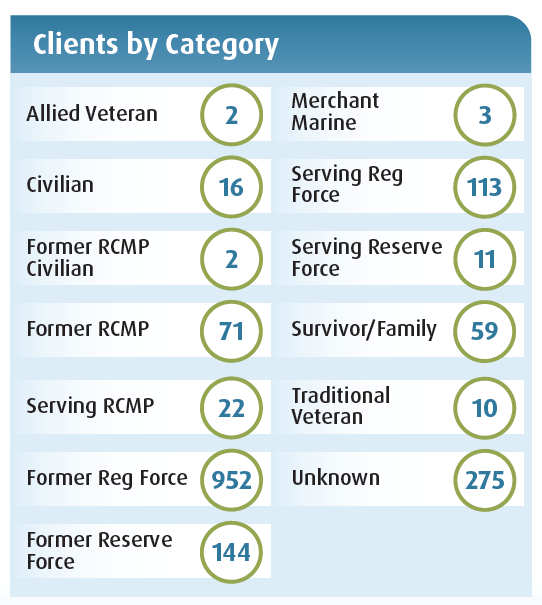
Alternative text
Clients by Category
- Merchant Marine: 3
- Former RCMP Civilian Member: 2
- Civilian: 16
- Allied Veteran: 2
- Traditional Veteran: 10
- Serving RCMP Member: 22
- Former RCMP Member: 71
- Family/Survivor: 59
- Unknown: 275
- Former Reserve Force Member: 144
- Serving Reserve Force Member: 11
- Serving Regular Force Member: 113
- Former Regular Force Member: 952
- Total Clients: 1680
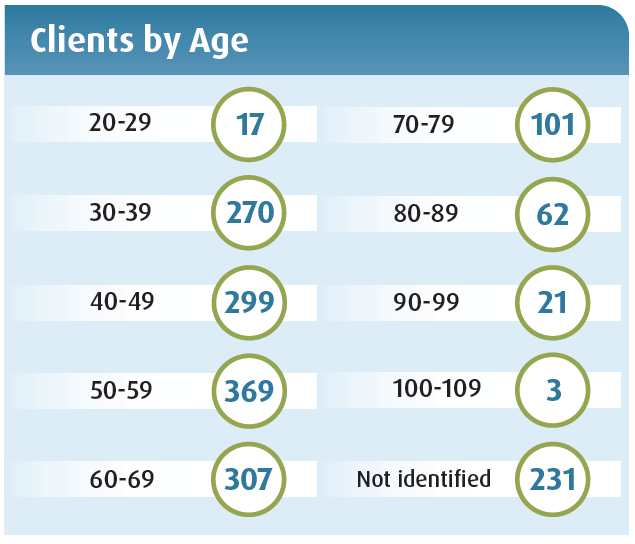
Alternative text
Clients by Age
Age 20-29 = 17
Age 30-39 = 270
Age 40-49 = 299
Age 50-59 = 369
Age 60-69 = 307
Age 70-79 = 101
Age 80-89 =62
Age 90+ = 24
Missing (not identified) = 231
Total Clients: 1680
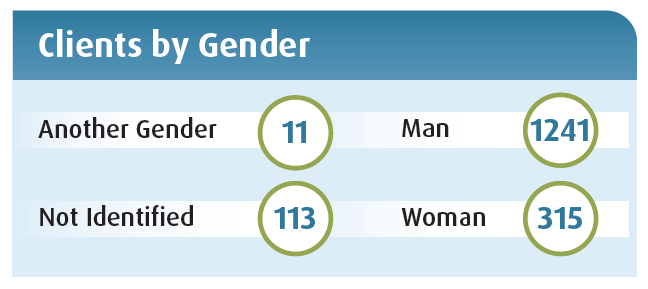
Alternative text
Clients by Gender
Another Gender = 11
Not identified = 113
Man = 1241
Woman = 315
Total Clients: 1680

Alternative text
Preferred Language
English = 1272
French = 408
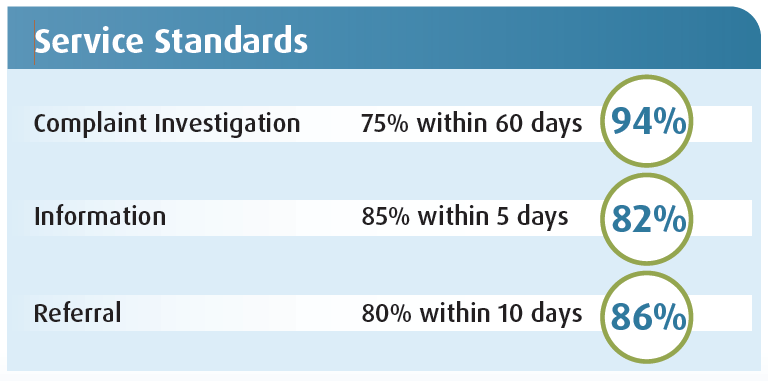
Alternative text
Service Standards
Complaint Investigation, Standard is 75% - 60 days, 94% achieved
Information, Standard is 85% - 5 days, 82% achieved
Referral, Standard is 80% - 10 days, 86% achieved
OUR WORK
Systemic Issues
In 2022-2023 our Strategic Review and Analysis team focused on identifying and addressing systemic fairness issues relating to VAC programs and services. We published two reports, one letter to the Minister of Veterans Affairs, one resource guide, and the 2022 Report Card.
Reports
As part of our work to identify barriers experienced by women Veterans, we reviewed whether Veterans had equitable access to fair and timely decisions for sexual dysfunction disability benefits.
Our report found sex-based biases in the VAC adjudication processes for sexual dysfunctions that disadvantaged female applicants. We made the following recommendations:
- Eliminate sex-based bias in the VAC adjudication of sexual dysfunction claims consequential to a psychiatric condition.
- Update the PEN 68e Medical Questionnaire to equitably capture sexual dysfunctions affecting all clients.
- Update the Table of Disabilities to standardize the adjudication process for all clients.
- Refine the granularity of the data collection systems in order to fully capture the nature of sexual dysfunction claims in the diverse VAC client population.
In October 2022, we presented our findings at the Canadian Institute for Military and Veteran Health Research forum in Halifax, Nova Scotia.
Disability Benefit Wait Times Update (September 2022)
Lengthy wait times for Disability Benefit decisions have been a fairness issue the OVO has followed for years. This year, we published an update to our 2018 study on wait times for disability benefits.
This update to our 2018 study, reviewed the disability claim decisions completed between April 1, 2021, and March 31, 2022.
We found that:
- On average, disability claim decisions for CAF applicants took 43 weeks, and for RCMP applicants 39 weeks.
- Francophone applicants continued to wait longer than their anglophone counterparts, with male francophone applicants waiting the longest.
- The gap in wait times between male and female applicants has closed.
- Wait times for RCMP applicants has improved.
This report urged VAC to meet its service standard for deciding Disability Benefit claims and to implement our 2018 recommendation to proactively triage applications based on unmet health needs.
Letter to the Minister of Veterans Affairs (December 2022)
The Ombud wrote a letter to the Minister of Veterans Affairs Canada highlighting unfairness in the way VAC is reducing Disability Pensions for some Merlo Davidson class action settlement claimants.
Following a complaint from the Chair of the RCMP Veterans Women’s Council, made on behalf of Merlo Davidson class action settlement claimants, the OVO reviewed the complaint and found unfairness.
To correct this unfairness the Veterans Ombud made two recommendations to the Minister:
That VAC immediately cease Disability Pension reductions for Merlo Davidson levels 1 and 2 claimants, and issue corrective payments to women who have had their pensions reduced.
That VAC publish the methodology for determining whether and in what amount Merlo Davidson compensation constitutes compensation for a pensioned disability and, if unable to do so, immediately cease Disability Pension reductions for claimants at levels 3 to 6 and issue corrective payments to those who have had their pensions reduced.
Care at Home Guide (October 2022)
The Care at Home educational guide aims to help Veterans and their families understand the benefits and services available through VAC that can help Veterans stay independent at home.
The Report Card tracks the status of the implementation of our recommendations to VAC.As of March 31, 2022, VAC has fully or partially implemented 69 percent or 52 of the OVO’s 75 recommendations, showing a slight improvement over last year.
These recommendations address systemic gaps or barriers to equitable access by Veterans and their families for VAC services and benefits, in order for Government to fulfill its obligation to those who have served their country.
For the first time, we included VAC responses to each of the partially or not implemented recommendations and were encouraged that they are monitoring or working to implement 18 of them. We highlighted outstanding recommendations of particular concern, including timely decisions for disability benefit decisions, mental health treatment for families in their own right, and permitting a single CAF member with no dependent children to designate a family member to apply for and receive the death benefit.
In addition to our publications, we commissioned an expert in ombudsmanry to conduct an independent technical review of our outstanding recommendations. The review provided advice on whether each recommendation is valid, requires revision, or should no longer be tracked. In 2023-2024 we will analyze the review results and implement changes as part of future Report Cards.